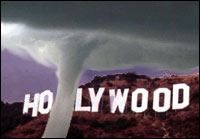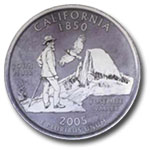Climate Culture
All Stories
-
Climate change too slow for Hollywood, too fast for the rest of us
It’s always been hard to get people to take global warming seriously because it happens too slowly. Not slowly in geological terms — by century’s end, according to the consensus scientific prediction, we’ll have made the planet warmer than it’s been in tens of millions of years. But slowly in NBC Nightly News terms. From […]
-
Bottled water flies off the shelves, but smart money is on filter systems
Thirsty for facts on bottled water? When the United Nations declared 2003 the International Year of Freshwater, they likely weren’t thinking of Perrier. And yet bottled water has become freshwater’s most high-profile face, from Evian to Dasani and scores of other brands that now crowd store shelves. Why have products that cost 240 to 10,000 […]
-
Umbra on environmentally oblivious teens
Dear Umbra, My girlfriend’s 14-year-old daughter lives with us, and she’s the most environmentally oblivious person I’ve ever met. She makes George Bush and Dick Cheney look like card-carrying members of the Green Party. She throws trash out the car window or tosses it on the street. She never shuts off a light or turns […]
-
Umbra on environmental stress
Dear Umbra, I’m the poster child for a late-twentysomething environmentally responsible adult. I use less than 100 gallons of gas a year, less than 100 kilowatt-hours of electricity a month, less than 20 gallons of water per day, less than 100 therms of natural gas during the winter in Minnesota. I take my garbage out […]
-
Umbra on environmentally oblivious family
Dear Umbra, I am totally frustrated with my in-laws. They know how important it is for us to raise our infant in the least toxic environment we can manage. However, when we go to their house, I have no control over the situation. We arrived there for Easter vacation only to find out that three […]
-
Announcing Umbra’s latest contest
Dearest Beloved Readers, Another turn of the seasons (still four, at last count) has brought us together again on the eve of Earth Day, the moment in the sun for the environmental movement, the fifth anniversary of Grist, and the second anniversary of my ability to freely pontificate into your inbox. It’s been a nice, […]
-
Tips on greener computing
OK computer. U.S. consumers are being cheated out of the chance to buy the greenest possible computers, according to the Silicon Valley Toxics Coalition and other environmental groups that have joined forces on the Computer TakeBack Campaign. The campaign’s latest report card examined 28 computer manufacturers’ practices regarding hazardous materials, worker health and safety, and […]
-
The U.S. has outsourced environmental leadership
On the money. California unveiled the design on its state quarter last week: a picture of John Muir, an image of Half Dome. It’s an apt representation of American environmentalism at the moment — rich in history, but not worth much at present. Modern environmentalism can fairly be described as an American invention. It got […]
-
Umbra on recycling CD jewel cases
Dear Umbra, I’ve been Googling all over to find a place where I can recycle old CD cases, to no avail. I’m moving soon and would really like to find an environmentally safe way to dispose of these things. Do you know of any place they can be dropped off, or any other alternatives? MelissaEdgewater, […]

